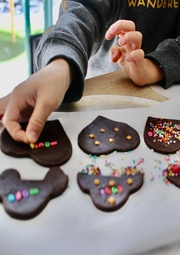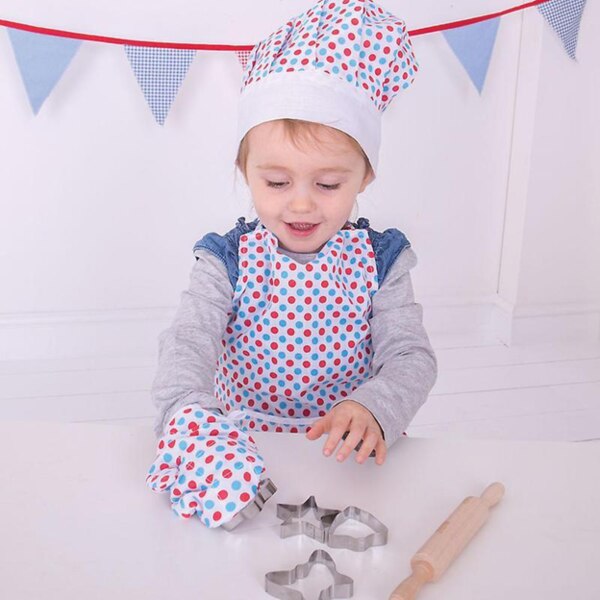5 Tips for Fun and Safe Baking With Kids
The idea of measuring out and mixing baking ingredients with your kids may sound stressful. However, when prepared and done correctly, baking provides many opportunities for children to express their creativity and develop various skills.
Your child can practise and improve their motor function, coordination, and strength, from pouring liquids to kneading dough. It can also help them increase their attention as they concentrate on measuring, counting, and following directions.
The ways baking can benefit your kids are countless. But how do you make it less stressful, more enjoyable, and accident-free? A bit of structure can help ensure kitchen safety and make the baking experience with children more delightful. To help you get started, we compiled the following tips for creating a fun and safe baking experience with kids.
1. Use Child-Friendly Baking Tools and Supplies
Involving your children in the kitchen at an early age helps them acquire valuable skills. But it’s always essential to prioritise safety when bringing little ones into the kitchen. Sharp instruments like knives, forks, and scissors can pose risks to children.
So, before you start a baking session, set up the kitchen for your kid’s safety. Secure any loose cords to keep them from accidentally yanking small appliances off the counter. Keep dangerous items out of their reach to avoid accidents.
Investing in child-friendly baking tools and supplies is also a good idea. Many kid-friendly choppers, whisks, dough cutters, and other culinary instruments are available. You can explore My Happy Helpers’ selection of kids’ baking sets for a starter.
Such tools are specifically designed for little hands. By providing children with their tools, you can reduce the risks of accidents and make them feel comfortable in the kitchen. It’s a great way to get your children involved happily and safely in your baking session.
2. Educate Kids About Kitchen Safety
Educating your kids about kitchen safety is essential as well. Besides locking away sharp tools and other hazardous items, set some kitchen rules with your children and explain the importance of following them. Here are a few safety reminders to begin with:
- Never start baking or cooking without adult supervision.
- Fasten long hair and wear an apron.
- Always ask permission before handling anything hot.
- Wash hands often using soap and water.
- Avoid making cookie dough or batter with raw eggs or flour.
- Never place your fingers on mixer blades.
- Use only food-safe plastic trays.
- Clear up spills right away.
- Always clean up after finishing baking or cooking.
3. Match Baking Task With Your Kid’s Age
Not all baking activities are appropriate for all children. Most of them may not yet have the physical skills to handle all the tasks required in baking. Hence, matching the baking activity with your kid’s age and cooking skills is crucial.
Remember that kids don’t have to do it on their own right away. It’s worth noting that complex tasks can cause them frustration, and too easy ones may lead to boredom. You can begin with the easier ones and allow them to progress to more complex baking tasks as they grow and learn.
For instance, pouring pre-measured ingredients into a mixing bowl, rolling cooking dough, or decorating cookies are a few ways to involve kids ages 2-4 in baking. Then, you can give them more baking responsibilities as they enter the ages of 5-7.
With your help, you can let them mix some ingredients using the hand-held electric mixer or cut out cookie shapes from the rolled dough. Giving your kids age-appropriate tasks will help establish their lifelong passion for baking and cooking while ensuring their safety and growth.
4. Select Kid-Friendly Baking Recipes
Setting realistic expectations is key in achieving success when baking with your kids. That starts with selecting baking recipes that are easy and kid-friendly. Of course, it also depends on the specific age of your children.
Baking simple goods like thumbprint cookies may be fascinating for toddlers. You can allow them to mix ingredients like chocolate chips or sprinkles. Simple batter recipes, such as muffins, quick bread, and brownies, can also provide young children to measure and mix ingredients. Meanwhile, older kids may find complex baking recipes more enjoyable.
When choosing a baking recipe, ensure that it will give your kids a sense of helping you. If baking is a new activity for them, make it simple enough for their age and abilities so they can easily participate and understand the process. It’s also wise to pick a recipe that uses familiar ingredients and basic techniques.
5. Make the Baking Activity Lighthearted and Fun
Prioritising safety is vital when baking with your kids. But don’t forget to make the activity lighthearted and fun. Put on some music or share fun stories related to your recipe. Children will continue learning to bake if they find the activity exciting and fun.
Conclusion
When baking with little ones, embracing the mess and letting go of your idea of perfection is essential. Your patience is necessary when doing this activity with your kids. If they accidentally drop an egg on the floor, let them know it’s perfectly fine and part of the learning process. Trying not to get upset at little mistakes will make the whole experience enjoyable for both of you.
Top Feature Photo by Olivia Oliver Design






